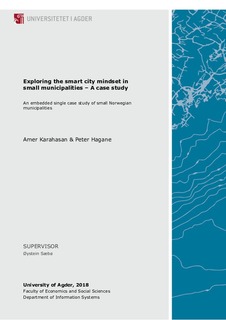| dc.description.abstract | The premise of this thesis is that cities and small municipalities are two closely related but
different types of entities. However, with regards to making settlements smarter, the smart
city has received ample attention, while the small smart municipality has been neglected
enough that an investigation into its trials and potential triumphs of the is warranted.
The purpose of this thesis is to acquire a deeper understanding of how and to what extent
small municipalities can adopt and apply the smart city mindset. In order to shed some light
on the subject matter, we have explored the state of applied ICT and smart city initiatives
where they exist in smaller Norwegian municipalities with a population of 15,000 citizens or
lower.
Using a six-dimensional smart city model as a basis, we have examined which challenges,
smartness interventions, and benefits are present in our selection of Norwegian small
municipalities. This study has been conducted as an embedded exploratory single case study,
where qualified personnel from smaller Norwegian municipalities have been interviewed on
the topic of municipal smartness. In total, 12 interviews with representatives of Norwegian
municipalities have been conducted, and one interview has been conducted with the
representative of an organisation for intermunicipal collaboration.
After conducting a thematic analysis, we reached a number of conclusions. Our findings
indicate that although few municipalities are labelling them self as smart municipalities, they
are actively working on introducing ICT and smartness-enabling interventions in new and
unorthodox ways. The most significant barriers to becoming smarter appear to be ICT
infrastructure deficit, a lack of ICT expertise, and economic limitations – issues that can be
ameliorated by combining resources through an intermunicipal cooperation. Those
municipalities who engage with the smart city concept are often driven by dedicated
personnel, like a project champion or an otherwise committed municipal leadership who are
aware of the smart city concept | nb_NO |

